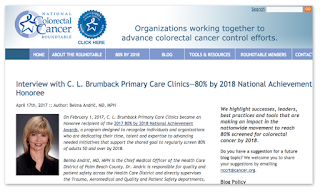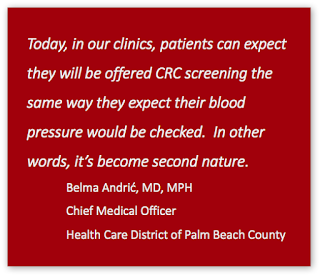A great interview this week with Belma Andrić, MD, MPH on the 80% by 2018 blog highlights successful approaches that can boost colon cancer screening rates at community clinics with underserved populations.
During her tenure as Medical Director with C. L. Brumback Primary Care Clinics in Florida, colon screening rates increased from 21 percent in 2013 to 82 percent in 2016 – meeting and surpassing the National Colorectal Cancer Roundtable’s goal of an 80 percent screening rate by 2018.
How did they do this? By tackling the issue at multiple levels and developing creative ways to work around barriers. Some lessons from their experience include:
Collaborate. Groups within the clinic not only worked together to improve screening rates but the clinics also worked with the Florida state primary care health systems manager and an American Cancer Society local liaison.
Staff a patient navigator. “This proved to be one of the best decisions we made,” Andrić says. The navigator was key to addressing the needs and concerns of the patients while also making sure screening efforts synched within the clinic system. One key aspect of the navigators’ work was to walk patients through the steps of colonoscopy bowel prep and to check in with them during the process.
Make the offer of screening “second nature.” One initial top barrier to screening was the fact that many patients were simply not being offered screening at their clinic visits. They addressed this problem through a combination of provider/team education, weekly check-ins, and some friendly competition between care teams – “doctors are very competitive.”
Make it easy and immediate. Clinics implemented a “Poop on Demand” program that asked patients if they wanted to provide a stool sample for testing while they were at the clinic. This boosted rates of FIT testing by 30 – 40 percent.
“Don’t get discouraged.” Barriers of all kinds pop up with any program. Expect that they will come up, even if the specific barriers are unexpected. Most can be overcome.
Seek extra funding. The clinics applied for – and received – an American Cancer Society Community Health Advocates implementing Nationwide Grants for Empowerment and Equity (CHANGE) grant, which helped them explore and implement strategies for improving screening rates.

